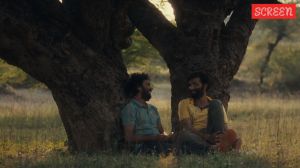‘Britain wants to see camps in PoK removed’
British High Commissioner Rob Young, 57, came to India in ’99, at a time when the bilateral relationship was at its nadir. Britain’...

British High Commissioner Rob Young, 57, came to India in ’99, at a time when the bilateral relationship was at its nadir. Britain’s reaction to India’s nuclear tests the year before and the Queen of England’s visit in 1997 had left quite a bitter taste in New Delhi’s mouth.
Midway through his tenure, the very understated Sir Rob seems to have returned a measure of professionalism to the business of diplomacy. Certainly, Britain and the US have been in the forefront, in recent months, of persuading General Musharraf to end cross-border terrorism. On the eve of the visit of British Foreign Secretary Jack Straw to India, he spoke to
:
• What is the agenda of Jack Straw’s visit to India?
He has been a fairly regular visitor to the region in the last few months which reflects the importance the British govt attaches to lowering tension (in the region).
He will be here to continue to ensure that appropriate action is taken to curb cross-border terrorism on the one hand and to encourage de-escalation on the other.
• Do you treat this as a sequence? What action have both governments taken in this regard?
WE’VE seen a serious drop in cross-border infiltration and we warmly welcome India’s steps in June to de-escalate. We want that process to continue. It’s not going very well at the moment. We want to see if we can help induce greater momentum.
• Why do you think the pace has slackened?
INDIA is saying there hasn’t been enough action to reduce cross-border infiltration or enough action on dismantling terrorist camps. We have been recipients of certain commitments from General Musharraf and it is extremely important that he delivers on those commitments. That is, a permanent end to infiltration, and dismantling the camps.
• What exactly did Musharraf tell your government?
IT was very clearly spelled out by the US State Department spokesman the day after General Musharraf’s interview to the Washington Post on June 23, and we endorse that formulation. There has been real progress on the end to cross-border infiltration but there is also quite a way to go, to make that permanent and seriously complete the process of dismantling the camps which are on the other side of the LoC.
• Has the dismantling of the camps begun?
I THINK there has been some movement, though we need to see further progress. At the same time, as the process of reducing support for cross-border terrorism develops, I know India is prepared to take further de-escalatory measures. What we want to see in the medium-term is a complete end to Pakistani support to cross-border terrorism leading to a resumption of dialogue so that India and Pakistan can resolve outstanding differences on Kashmir peacefully.
• So, has Pakistan not permanently ended that infiltration?
I THINK ‘‘permanently’’ is a word that is inevitably time-related. So far we have seen a significant drop in cross-border, cross-LoC infiltration. We want to see that sustained and completed and camps in Pakistan-occupied Kashmir removed. We shall then be able to say that there has been an end to cross-border terrorism.
• Should India and Pakistan start talks now?
OUR interest lies in creating the right environment in which cross-border terrorism is stopped, or virtually stopped…for talks to be resumed and sustained… I suspect there will always be maverick groups that will try and cause disruption, try and cross the LoC, that will try and mount violent attacks in Jammu & Kashmir independently.
We found that in Northern Ireland, renegade groups, splinter groups that have nonetheless managed to try to subvert the process by mounting violent attacks. There will never be a total turning off the tap.
• Will the Kashmir polls be a watershed?
THE Kashmir elections will obviously be important in many ways. The Government of India is seeing the elections as a test of Pakistan’s intentions on the issue of cross-border terrorism.
• Do you agree with that?
I THINK it will be important to try and show that these elections are held in as peaceful an atmosphere as possible. I know India wants to see an election which has the widest possible participation, to be free and fair, and inclusive as the international community would like them to be.
They are important, too, as part of the process of building a new political environment for Kashmir, developing a new process between Kashmiri groups, Srinagar and the Centre. The elections will not be an end in themselves.
• How do you look at a post-poll scenario?
SOME of those building blocks are already in place, after all, both the Centre and Srinagar have nominated people to talk about ‘‘autonomy.’’ Some people worry about the word ‘autonomy,’ but I think that’s what the talks are going to be about. I think that’s a sign the government realises there is a desire within J&K for progress on that issue and I personally welcome what has been done so far.
Another element is (about) developing the economy in J&K, which Prime Minister Vajpayee talked about during his visit to the state. And all this can carry on, with whatever parallel dialogue is reestablished between Delhi and Islamabad.
• Would you say there is a moment of truth on Kashmir?
I HOPE so. I think there is an unprecedented opportunity for the issue of terrorism in the region to be tackled actively and in a durable way. India seems to have grasped that opportunity in the last 6-8 months following September 11. There is also a far greater understanding today of the Kashmir issue…and the importance of the terrorism issue in connection with Kashmir.
• That there is cross-border terrorism, from Pakistan into Kashmir…
Quite..
• And that has a role to play in the problem in Kashmir?
Kashmir has been seen too often in the past through the eyes of the UN resolutions or the Shimla Agreement. But certainly for the last 12-13 years…(we have) come to realise what is going on on the ground and the way it’s affecting the politics.
• Could the solution be to convert the LoC into the international boundary?
THAT’S up to the two countries. Certainly, as far as the international community is concerned, the notion of the LoC’s sanctity became very much accepted during the Kargil crisis.
• Does the peace process in Northern Ireland have some lessons for Kashmir?
THERE is one big difference, that in the last 15 years the British and Irish governments have been working together, which India and Pakistan have not. Nevertheless there are certain ideas which merit further thought both on the process and the substance, (such as) in the way we conducted parts of the negotiation in secrecy.
• Your views on international observers in the Kashmir elections?
WE welcome the announcement of the Election Commission. We could send individuals from this High Commission.
• The bilateral relationship?
IT is very good. We have achieved a depth of understanding which is as good as it’s ever been. I cannot think of a single area in which we and India are not consulting and coordinating closely.
• It’s a long way from Pokharan four summers ago?
YES, we’ve come a long way, indeed.
Photos


- 01
- 02
- 03
- 04
- 05





























